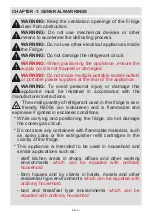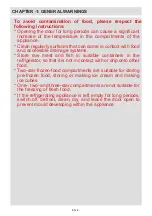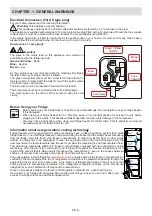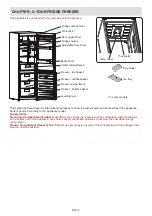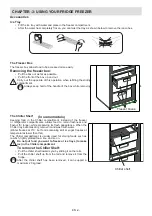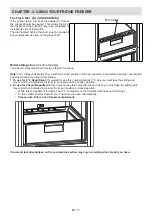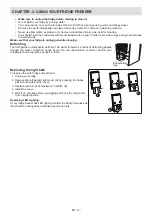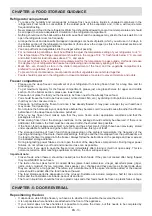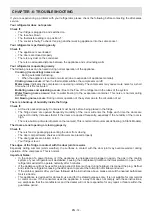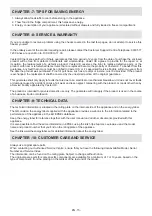
EN -14-
CHAPTER -6: TROUBLESHOOTING
If you are experiencing a problem with your refrigerator, please check the following before contacting the after-sales
service.
Your refrigerator does not operate
Check if:
•
Your fridge is plugged in and switched on
•
The fuse has blown
•
The thermostat setting is on position '1'
•
The socket is faulty. To check this, plug another working appliance into the same socket.
Your refrigerator is performing poorly
Check if:
•
The appliance is overloaded
•
The doors are closed properly
•
There is any dust on the condenser
•
There is an adequate distance between the appliance and surrounding walls
Your refrigerator is operating noisily
The following noises can be heard during normal operation of the appliance.
Cracking (ice cracking) noise occurs:
•
During automatic defrosting.
•
When the appliance is cooled or warmed (due to expansion of appliance material).
Clicking noise occurs:
When the thermostat switches the compressor on/off.
Motor noise:
Indicates the compressor is operating normally. The compressor may cause more noise for a short
time when it is first activated.
Bubbling noise and splashing occurs:
Due to the flow of the refrigerant in the tubes of the system.
Water flowing noise occurs:
Due to water flowing to the evaporation container. This noise is normal during
defrosting.
Air blowing noise occurs:
During normal operation of the system due to the circulation of air.
There is a build-up of humidity inside the fridge
Check if:
•
All food is packed properly. Containers must be dry before being placed in the fridge.
•
The fridge doors are opened frequently. Humidity of the room will enter the fridge each time the doors are
opened. Humidity increases faster if the doors are opened frequently, especially if the humidity of the room is
high.
•
There is a build-up of water droplets on the rear wall. This is normal after automatic defrosting (in Static Models).
The doors are not opening or closing properly
Check if:
•
There is food or packaging preventing the door from closing
•
The door compartments, shelves and drawers are placed properly
•
The door gaskets are broken or torn
•
Your fridge is level.
The edges of the fridge in contact with the door joint are warm
Especially during summer (warm weather), the surfaces in contact with the door joint may become warmer during
operation of the compressor. This is normal.
Important Notes:
•
In the case of a power failure, or if the appliance is unplugged and plugged in again, the gas in the cooling
system of your refrigerator will destabilise, causing the compressor protective thermal element to open. Your
refrigerator will start to operate normally after 5 minutes.
•
If the appliance will not be used for a long period of time (such as during holidays), disconnect the plug. Defrost
and clean the refrigerator, leaving the door open to prevent the formation of mildew and odour.
•
If the problem persists after you have followed all the instructions above, please consult the nearest Authorised
Service Centre.
•
This appliance is designed for domestic use and for the stated purposes only. It is not suitable for commercial
or common use. If the consumer uses the appliance in a way that does not comply with these instructions,
we emphasise that the manufacturer and the dealer will not be responsible for any repair or failure within the
guarantee period.



